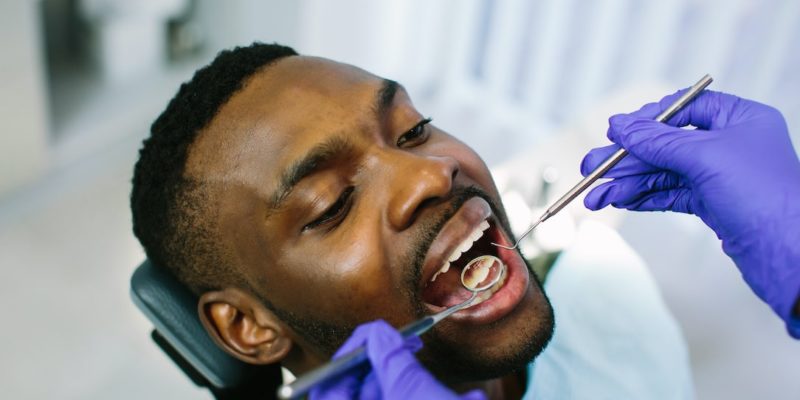Signs of Mouth Cancer You Might Not Know

Do you know what the signs of mouth cancer are? Mouth cancer develops on any portion of the mouth, including the lips. November is Mouth Cancer Awareness month, and Dr. Ania’s team is here to help you understand what this cancer is, how to look out for it, and what you can do to reduce your risk of developing it. This kind of cancer, like all cancers, can be life threatening without proper prevention and early detection.
What is Mouth Cancer?
Mouth cancer, also sometimes referred to as oral cancer, is a type of cancer that is found in the mouth. It can develop in any area of the oral cavity, such as the:
- Lips
- Gums
- Tongue
- Inner lining of the cheeks
- Roof of the mouth
- Floor of the mouth (under the tongue)
Symptoms of Mouth Cancer
In the early stages of mouth cancer, you might not be able to notice anything wrong with your mouth at all. However, dentists are trained to catch the early signs that you might miss with your own eyes. As the disease develops, patients can begin noticing symptoms like:
- Bleeding in the mouth with no clear cause
- Loss of feeling in different areas of the mouth
- Lumps in the mouth that continue to grow
- Rough spots on the lips, gums, and other soft tissues of the mouth
- White or red patches in the mouth
- Sores on the face, neck, or inside the oral cavity that don’t heal quickly and bleed
- Changes in voice
- Persistent sore throat
- Weight loss with no clear cause
- Difficulty chewing and swallowing
- Inability to move the tongue or jaw easily
Causes and Reducing Your Risk
While there are some risk factors in your chance of developing cancer that you can’t help — like your age, sex, or race — others you can. There are certain lifestyle factors that can increase your risk of developing this type of cancer. According to the American Cancer Society, these are the risk factors for developing mouth cancer:
Tobacco use
Most people diagnosed with this kind of cancer use tobacco. While the risk depends on how long and often the tobacco has been used, smokers are much more likely to develop cancer in the mouth, throat, and lungs than non-smokers. If you still smoke, quitting now can still help reduce your risk. If you have been diagnosed with an oral cancer, it is important to quit smoking, as continuing can increase your risk of a second cancer of developing.
Excessive alcohol use
If you are an excessive alcohol drinker, you are more likely to develop mouth cancer. In fact, 7 out of 10 patients with oral cancer are heavy drinkers.
HPV infection
The human papillomavirus (HPV) is a group of over 150 viruses. Infection with certain types of HPV can cause forms of cancer, including cancers of the mouth and throat. Most people with HIV infections of the mouth don’t have any symptoms, however, the cancer cases linked to HPV have risen dramatically in the last few decades.
Gender
This type of cancer is twice as common in men than it is in women, partially due to the fact that men have been more likely to use tobacco and alcohol in the past.
Age
While you can develop cancer at any age, mouth cancers usually take many years to develop and it is not common in young people. Most patients with this condition are older than 55.
UV light
Being out in the sun without proper sunblock can cause cancers of the lip.
Poor nutrition
Many studies have found that not eating a healthy diet can increase risk of certain kinds of cancers
Weakened immune system
Oral cavity cancers are more common in those that have weak immune systems.
Poor oral health
If you have poor overall health of the mouth, teeth, and gums, it can negatively affect your oral cavity and increase your risk of developing mouth cancer.
Make an Appointment with Dr. Ania
Your best fight against mouth cancer is early detection. Dr. Ania is trained to detect the early signs and symptoms of mouth cancer. During your comprehensive dental exam, which should happen twice a year, Dr. Ania will thoroughly examine your mouth and look for problems. When you come in for your exam, an oral cancer screening will be done in a matter of minutes. Dr. Ania will look over your teeth, gums, cheeks, tongue, throat and even outside your mouth around your neck and mouth for lumps and signs that something isn’t right. With the right dental and medical care, a dentist can actually help halt the progression of the cancer when they find it. If you notice signs before your next scheduled checkup, call to get an appointment with Dr. Ania sooner: (303)-872-9940. Early detection is key!


